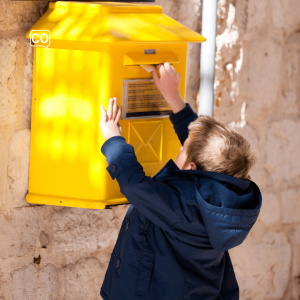Realizando un intercambio

Learning goals:
- Habla sobre hacer un intercambio (Talk about doing an exchange)
- Organizar tu estancia en el extranjero (Organising your stay abroad)
- Expresar lo positivo y lo negativo (Expressing the positive and the negative)
- Intercambio universitario en España: los destinos más buscados (University exchange in Spain: the most sought-after destinations)
Learning module 4 (A2): Trabajar y estudiar (Work and study)
Recap exercises of the previous lesson
Teaching guidelines +/- 60 minutes
Core vocabulary (11)

Durante el intercambio, me di cuenta de que hablar el idioma mal puede ser una oportunidad para aprender más.
(During the exchange, I realised that speaking the language poorly can be an opportunity to learn more.)
Mal
(Badly)

El idioma español es buenísimo para aprender.
(The Spanish language is brilliant for learning.)
Bueno
(Good)

Lo malo de los intercambios es que a veces puedes extrañar tu país, pero la aventura de conocer un nuevo idioma y una nueva cultura siempre vale la pena.
(The downside of exchanges is that sometimes you might miss your country, but the adventure of learning a new language and culture is always worthwhile.)
Malo
(Badly)

La aventura del intercambio fue una oportunidad increíble para aprender el idioma.
(The adventure of the exchange was an incredible opportunity to learn the language.)
La aventura
(The adventure)

El intercambio fue una buena oportunidad para mejorar el idioma.
(The exchange was a good opportunity to improve the language.)
El intercambio
(The exchange)

La beca es una oportunidad increíble para estudiar en el extranjero.
(The scholarship is an incredible opportunity to study abroad.)
La beca
(The scholarship)

El ambiente aquí es más extranjero que en su país de origen.
(The environment here is more foreign than in their home country.)
Extranjero
(Foreign)

Durante el intercambio, aprendí un nuevo idioma, lo cual fue una experiencia positiva para mí.
(During the exchange, I learned a new language, which was a positive experience for me.)
El idioma
(The language)

La oportunidad de un intercambio en el extranjero es buena para practicar el idioma.
(The opportunity for an exchange abroad is good for practising the language.)
La oportunidad
(The opportunity)
Listening materials
Our listening materials implement the verbs, vocabulary and grammar topics of this lesson. Audio and video available!
A2.24.1 Diálogo: La gran aventura del intercambio
Spanish A2.24.1 The great exchange adventure
Ana y Pedro hablan sobre la experiencia de ir a un intercambio al extranjero.
(Ana and Pedro talk about the experience of going on an exchange abroad.)
Teaching guidelines +/- 15 minutes
A2.24.2 Gramática: Expresar lo positivo y lo negativo
Spanish A2.24.2 Expressing the positive and the negative
(When we want to express if something is positive or negative in Spanish, we use expressions like "está bien" or "es bueno" for the positive and "está mal" or "es malo" for the negative.)
Teaching guidelines +/- 15 minutes
A2.24.3 Cuento corto: Un intercambio en el extranjero
Spanish A2.24.3 An exchange abroad
María recibe una beca para un intercambio en un país extranjero. Vive aventuras y enfrenta desafíos con una actitud positiva.
(Maria receives a scholarship for an exchange in a foreign country. She lives adventures and faces challenges with a positive attitude.)
Teaching guidelines +/- 15 minutes
A2.24.4 Cultura: Intercambio universitario en España: los destinos más buscados
Spanish A2.24.4 University exchange in Spain: the most sought-after destinations
Descubre por qué España es uno de los destinos más populares para estudiantes de Erasmus+. Cultura, clima, y amigos hacen de esta experiencia algo único.
(Discover why Spain is one of the most popular destinations for Erasmus+ students. Culture, climate, and friends make this experience unique.)
Teaching guidelines +/- 10 minutes
Exercises
These exercises can be done together during conversation lessons or as homework.
Exercise 1: Find the words
Instruction: Find the words, mark them and make sentences with the words.
Show answers Show hintsHints
The scholarship , Badly , Foreign , Well , The opportunity , The exchange
Answers
Score: 0/6
| Bien | (Well) |
| La beca | (The scholarship) |
| La oportunidad | (The opportunity) |
| Extranjero | (Foreign) |
| El intercambio | (The exchange) |
| Mal | (Badly) |
Exercise 2: Reorder sentences
Instruction: The words in these sentences have been shuffled! Sort them so that they make a valid sentence again and translate.
Show answers Show translationExercise 3: Translate and make sentences
Instruction: Translate the words and phrases below and use it in a conversation or text.
Show answersExercise 4: Translate and use in a sentence
Instruction: Translate and say the word out loud. Use the word in a sentence.
Show translation|
1.
La oportunidad
|
(The opportunity) |
|
2.
Bien
|
(Well) |
|
3.
Extranjero
|
(Foreign) |
|
4.
La beca
|
(The scholarship) |
|
5.
La aventura
|
(The adventure) |
Exercise 5: Conjugación verbal
Instruction: Choose the correct word, read the sentence out loud and translate.
Show answers Show translationConfirmar (Pretérito indefinido, indicativo), Confirmar (Pretérito perfecto, indicativo)
1. Vosotros ... la reserva del vuelo.
2. Nosotros ... que la excursión al bosque fue divertida.
3. Yo ... la reserva en el camping.
4. Él ... la salida del grupo al campo.
5. Tú ... tu participación en la excursión.
Exercise 6: Expressing the positive and the negative
Instruction: Choose the correct word, read the sentence out loud and translate.
Show answers Show translationEstá mal, Es bueno, Está bien
1. Negativo (estar): ... viajar sin confirmar la reserva de tu alojamiento.
2. Positivo (estar): ... mandar un correo de agradecimiento después de recibir la beca.
3. Positivo (estar): ... aprovechar la oportunidad de la beca para estudiar en el extranjero.
4. Negativo (estar): ... no comunicarte con tus compañeros de intercambio sobre los planes de la aventura.
5. Positivo (estar): ... aprender un nuevo idioma antes de participar en un intercambio cultural.
6. Positivo (estar): ... aprovechar cada oportunidad de hacer nuevos amigos durante tu aventura en el extranjero.
7. Positivo (ser): ... probar nuevas comidas cuando estás en un intercambio cultural.
8. Negativo (estar): ... no prepararse antes de una aventura en un país extranjero.
Exercise 7: Translate and make sentences
Instruction: Translate the words and phrases below and use it in a conversation or text.
Show answersAppendix 1: Extended vocabulary table
Core vocabulary
(11):
Verbs: 1,
Adjectives: 2,
Adverbs: 3,
Nouns: 5,
Context vocabulary:
5
| Spanish | English |
|---|---|
| Bien | Well |
| Buenas | Good |
| Bueno | Good |
| El idioma | The language |
| El intercambio | The exchange |
| Extranjero | Abroad |
| Has mandado | Have you sent |
| La aventura | The adventure |
| La beca | The scholarship |
| La oportunidad | The opportunity |
| Mal | Wrong |
| Mala | Bad |
| Malo | Badly |
| Manda | Finally, he sends a message to his parents. |
| Mandar | To send |
| Oportunidad | Opportunity |
Appendix 2: Verb conjugation tables for this lesson
Confirmar (to confirm)
Exercises and examples phrases
- yo he confirmado I have confirmed
- tú has confirmado You have confirmed
- él/ella ha confirmado He/she has confirmed
- nosotros/nosotras hemos confirmado We have confirmed
- vosotros/vosotras habéis confirmado you have confirmed
- ellos/ellas han confirmado they have confirmed
Confirmar (to confirm)
Exercises and examples phrases
- yo confirmé I confirmed
- tú confirmaste you confirmed
- él/ella confirmó he confirmed
- nosotros/nosotras confirmamos We confirmed
- vosotros/vosotras confirmasteis you confirmed
- ellos/ellas confirmaron They confirmed
Exercise: Verb conjugation
Instruction: Choose the correct word, read the sentence out loud and translate.
Show answers Show translationConfirmar (Pretérito indefinido, indicativo), Confirmar (Pretérito perfecto, indicativo)
1. Vosotros ... la reserva del vuelo.
2. Nosotros ... que la excursión al bosque fue divertida.
3. Yo ... la reserva en el camping.
4. Él ... la salida del grupo al campo.
5. Tú ... tu participación en la excursión.




